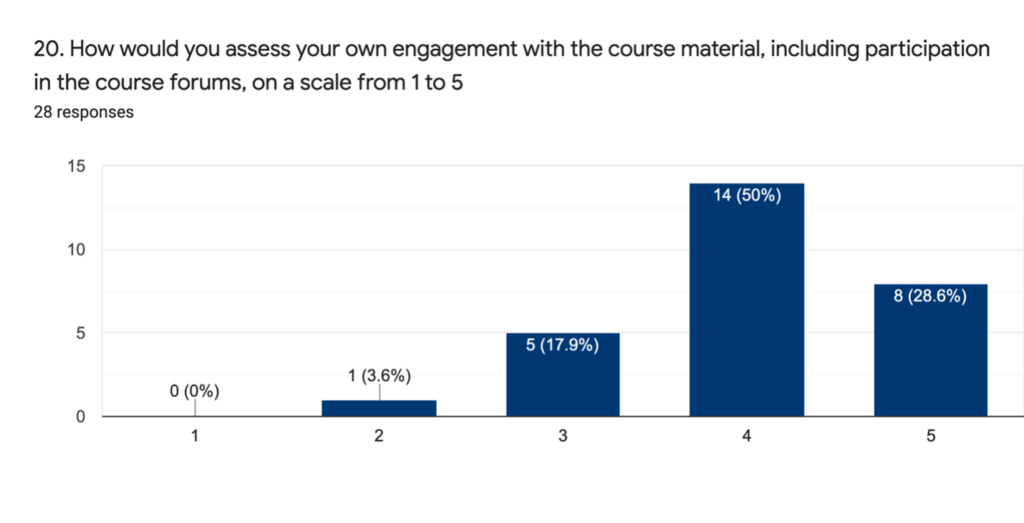2021 ICNC Moderated Online Course Assessment
ICNC offered the moderated online course “People Power: The Strategic Dynamics of Civil Resistance” which took place from October 1 to November 18, 2021. This was the tenth year that ICNC has run this course.
Read more about the 2021 course and assessments below.
You can also view assessments from previous courses in 2020, 2019, 2018, 2017, 2016, 2015, 2014, 2013, and 2012.
Applications, Admission and Course Participants
In 2021, ICNC received 92 applications for the People Power online course. The quality of applications was high and it took several rounds of reviews to select the 57 participants who were invited to take part in the online course.
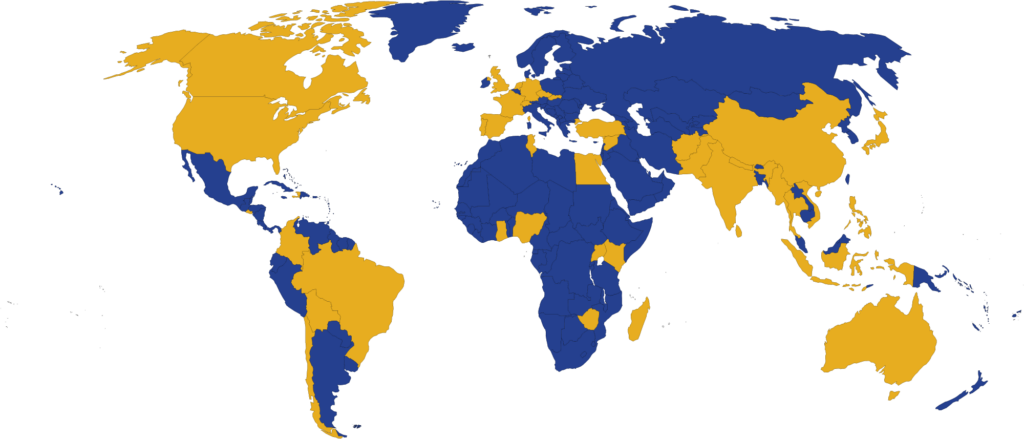
The 57 accepted applicants came from a wide range of backgrounds and countries, as shown in the graphs below. The largest number of participants came from Sub-Saharan Africa with 14, the Americas with 12. East and Southeast Asia had 11 participants combined, while Europe had 9 participants. Central and South Asia had 7 participants combined. The Middle East also had 7 participants and Oceania had 1. Below is a visual breakdown per region.
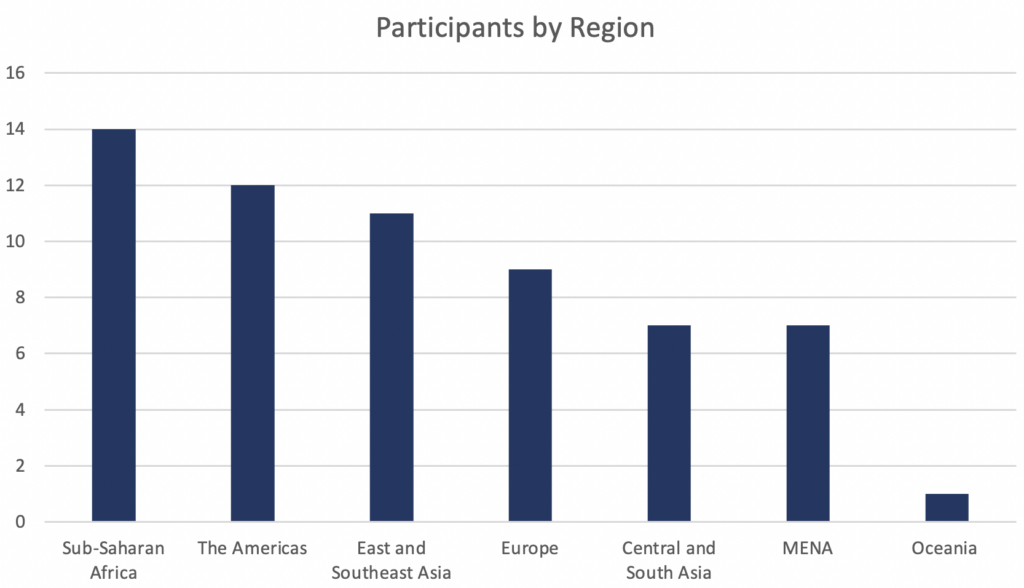
The accepted participants also came from a diverse range of professional backgrounds. The majority of participants had a background in activist/movement building, followed closely by a background in research and academia, and then by a background in internationally focused NGOs. Participants could choose more than one answer when selecting their background.
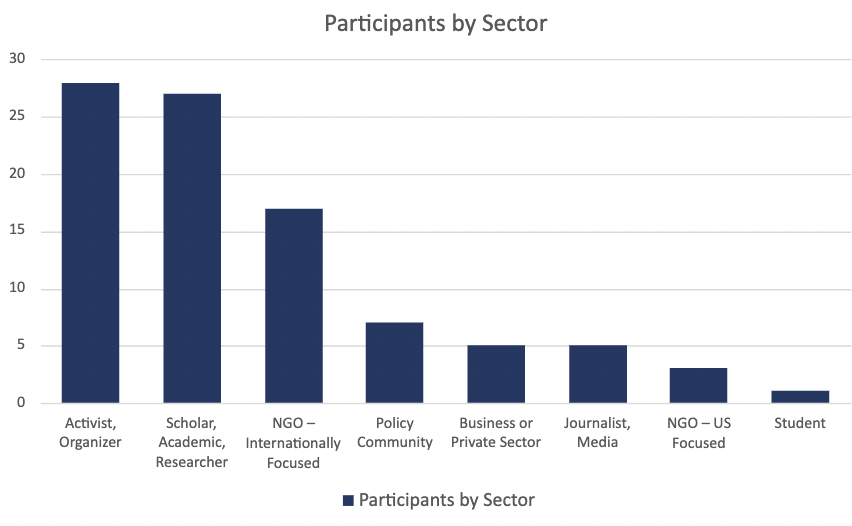
Before the course began, ICNC hosted two orientation webinars for course participants. A total of 36 participants attended the webinars. Each orientation webinar contained survey questions asking about the participant’s experience and what they hoped to gain from the course. In summary, the majority of participants indicated that they had organized or participated in a CR campaign. The were excited about gaining theoretical knowledge about CR campaigns and gaining insights from other nonviolent campaigns. Participants wanted to listen with curiosity and share their on-the-ground experience with other learners. The participants also wanted to take their learnings from the course to organize CR campaigns and in training and coaching. Below are the results from the two sessions’ surveys combined.
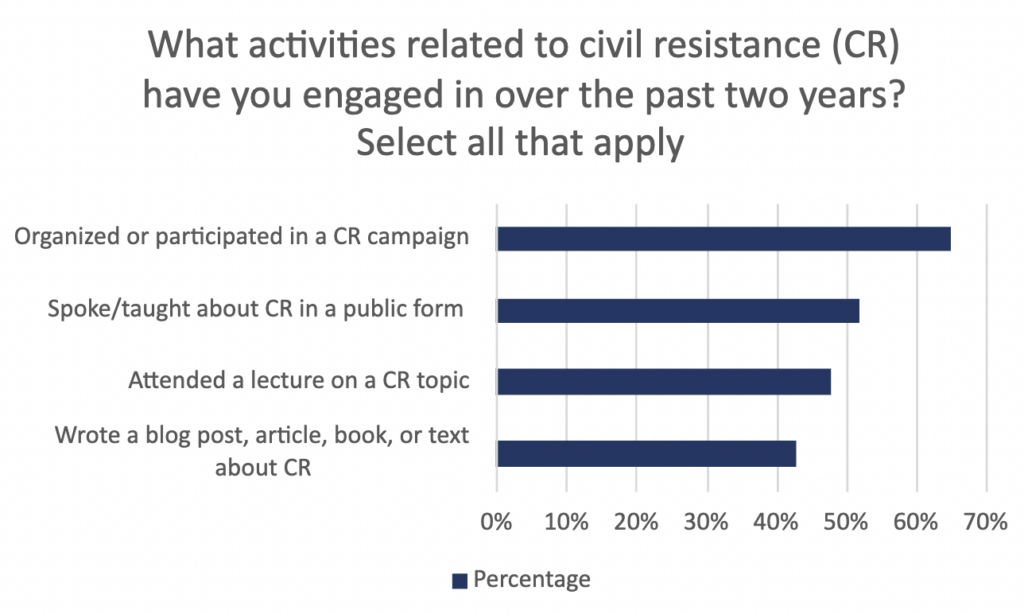
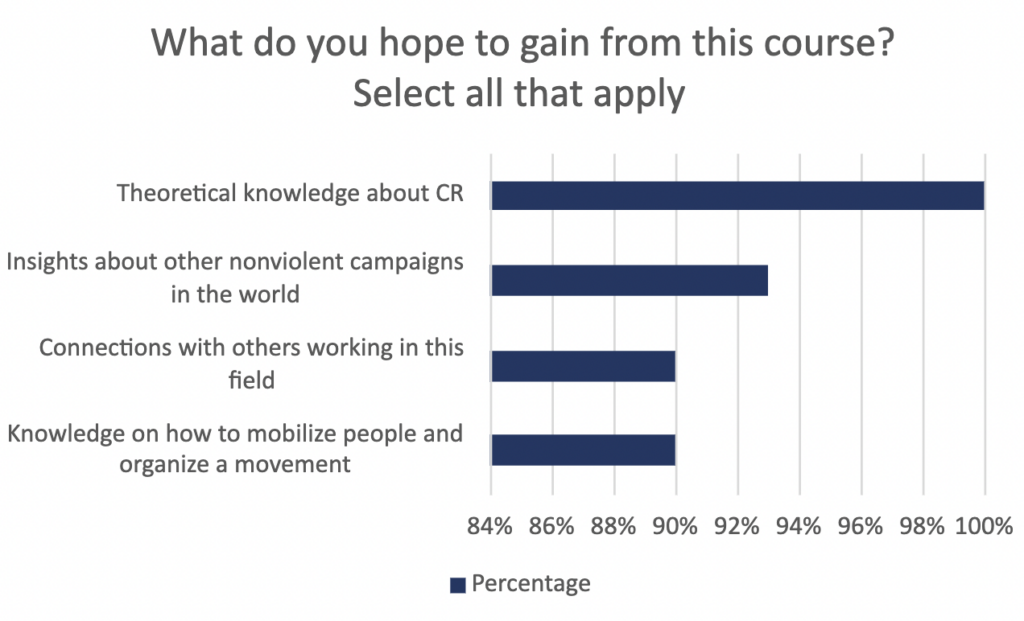
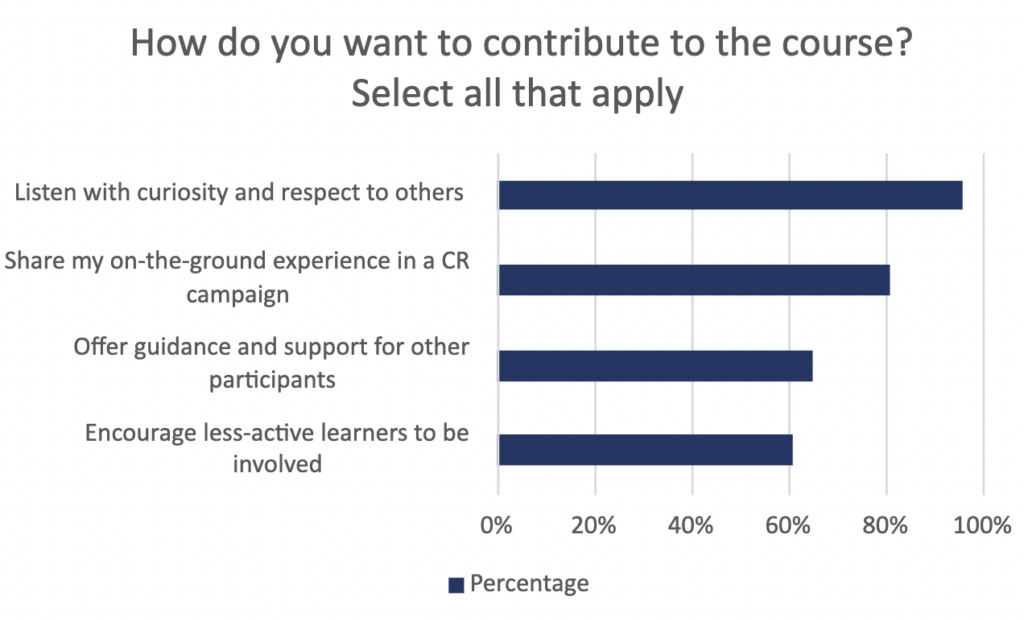
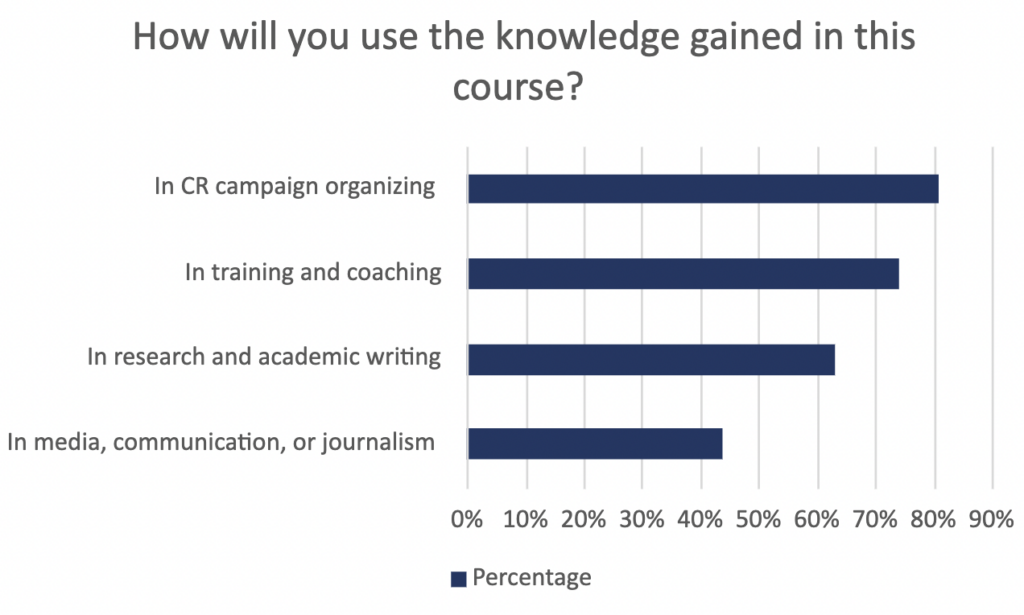
Course Content
For the third year, ICNC had former course participants moderate the course. These were alumni from previous courses who brought unique perspectives. ICNC intentionally asked former participants from Africa and South America in order to bolster the conversation on civil resistance. Alumni moderators also provided summaries of the forum discussions in a particular module, highlighting key points made, debates taking place and core information that was shared.
Course participants also had access to the ICNC Mobile App, available on iOS and Android. By using the app, participants could download the course content and access it offline when they were traveling or if they were in areas with low internet access.
Module 1: Welcome and Introductions
In the welcome module, we laid out the objectives of the course. We discussed course activities, including forum posts, recorded webinars, readings, videos, webinar meetings and online discussions. We then introduced the participants and course organizers and moderators. We provided online learning tips to help participants make the most of the online learning experience. Finally, we introduced participants to the People Power Game: A Strategic Game About Civil Resistance, a computer-based simulation that participants play throughout the course, during which the player takes on the role of a strategic planner for a nonviolent movement.
Module 2: Foundation of Civil Resistance
In this session, participants looked at what strategy in civil resistance is, and how it relates to tactics. We examined examples of different tactics, including cultural resistance tactics, and discuss tactical innovation, including strategic sequencing of tactics that enhance the effectiveness of nonviolent methods and campaigns. We also looked at the strategic importance of women’s leadership and participation in civil resistance for success and for maintaining nonviolent discipline. We explored different conflict analysis tools that help movements systematically assess and analyze the battlefield in which they are engaging nonviolently. Finally, we considered the role of culture and the creative opportunities it presents in our tactical choices.
Module 3: Historical Cases of Civil Resistance Around the World
In this module, participants engaged with the historical record of civil resistance, completing reports on two movements each that covered their goals, strategies, tactical choices, their degree of success, and responses to their movements. Participants used one of ICNC’s newest course features, an interactive timeline on the history of civil resistance, to complete this assignment. This timeline tool covers over 100 representative movements and campaigns from around the world, divided into four categories: national liberation, civilian safety and autonomy, defense and expansion of rights, and public accountability cases.
Module 4: Strategy and Tactics of Nonviolent Struggle
In this session, participants looked at what strategy in civil resistance is, and how it relates to tactics. We examined examples of different tactics, including cultural resistance tactics, and discuss tactical innovation, including strategic sequencing of tactics that enhance the effectiveness of nonviolent methods and campaigns. We also looked at the strategic importance of women’s leadership and participation in civil resistance for success and for maintaining nonviolent discipline. Finally, we explored different conflict analysis tools that help movements systematically assess and analyze the battlefield in which they are engaging nonviolently.
Module 5: Repression, Backfire, and Defections
In this session, we started with a discussion about repressive contexts in which nonviolent resistance movements take place, and the phenomenon of backfire when violence against unarmed activists boomerangs back to those who carried out the repression. We explored how civil resistance movements can optimize the impact of backfire and use it to their advantage. How does the side that uses repression aim to hinder potential backfire? We then discussed defections that often, though not always, occur as a result of the backfire effect. This module focused on understanding defections from one group — security forces — and explores conditions under which the defections might happen. It also explored how regimes often try to mitigate the likelihood of security defections, and strategies that movements might deploy to increase chances of loyalty shifts among security forces.
Module 6: Violent Flanks, Agent Provocateurs, and Maintaining Nonviolent Discipline
In this session, we looked at how movement violence, whether real or perceived, can backfire against our movements and make them smaller, weaker, and less effective. We first explored the negative impacts that are most likely when sincere activists organize violent flanks to achieve the same goals as a civil resistance movement, or when civil resisters choose to engage in violent activities alongside of their nonviolent actions. In addition, we took a detailed look at how power elites routinely use undercover “agent provocateurs” (an anglicized French term for “inciting agents”) to increase both the real or perceived violent flank activity within our movements to make our movements easier to defeat. Finally, we explored several methods for increasing the nonviolent discipline of our movements in order to increase their effectiveness and chances of victory.
Module 7: New Frontiers in Civil Resistance Studies
This module explored a variety of topics in the study of civil resistance, including faith communities and civil resistance, democratization and civil resistance, and civil resistance and corporate governance, and civil resistance during war. These topics were considered new frontiers in the quickly evolving field of civil resistance studies. They are often seen as either under-researched or only now gaining significance in the analysis of nonviolent conflict.
Module 8. Final Course Evaluation & Learning Gains Survey
In the last two days of this online course we solicited participants’ views about the course and their learning experience. We asked about their learning progress, overall educational experience, assessment of the course content, interactions in the forums, and their personal engagement during the six-week period. This feedback has allowed us to improve our future online courses and make our teaching pedagogy on civil resistance more effective and more impactful on all learners involved.
Learning Gains Survey Results
Included below are the graphed responses to selected questions from the learning gains survey (conducted among the same group of participants that took both surveys) that demonstrate the extent of the knowledge gains from before and after the course.
The Pre-Course Learning Gains survey was completed by 29 participants and Post-Course Learning Gains survey by 29 participants. The comparative results from Pre and Post-Course surveys, included in the graphs below, are based on the responses of the 29 participants that filled out both surveys. You can use the links below to navigate directly to each graph. You can also view the full 2021 People Power Moderated Course Learning Gains Report.
- How actively involved have you been in leading or planning a civil resistance campaign in the last 3 months?/After completing the online course, how much more likely do you think you will become involved in leading or planning a civil resistance campaign?
- How skilled do you feel you are in planning or implementing a civil resistance campaign?/How skilled do you feel you are now in planning or implementing a civil resistance campaign?
- If you are currently participating in a civil resistance campaign, how effective do you think you are in achieving your campaign’s stated objectives in your current training’s and actions?/After having completed the online course, how much more effective do you believe you will be in achieving the stated objectives of your civil resistance trainings or campaigns?
- If you are actively involved in writing, researching, or teaching about civil resistance, how effective do you consider your work?/After taking the online course, how much more effective do you believe your writing, researching, speaking or teaching will be?
- On the scale below, select the number that best represents your current knowledge of civil resistance or nonviolent movements./On the scale below, select the number that best represents your current knowledge of civil resistance or nonviolent movements.
Selected Graphs
3. How actively involved have you been in leading or planning a civil resistance campaign in the last 3 months?/After completing the online course, how much more likely do you think you will become involved in leading or planning a civil resistance campaign?
Pre-course survey:
Before the course began, about 82% of respondents reported that they had not been (options 1, 2, and 3) actively involved in leading or planning a civil resistance campaign in the last 3 months.
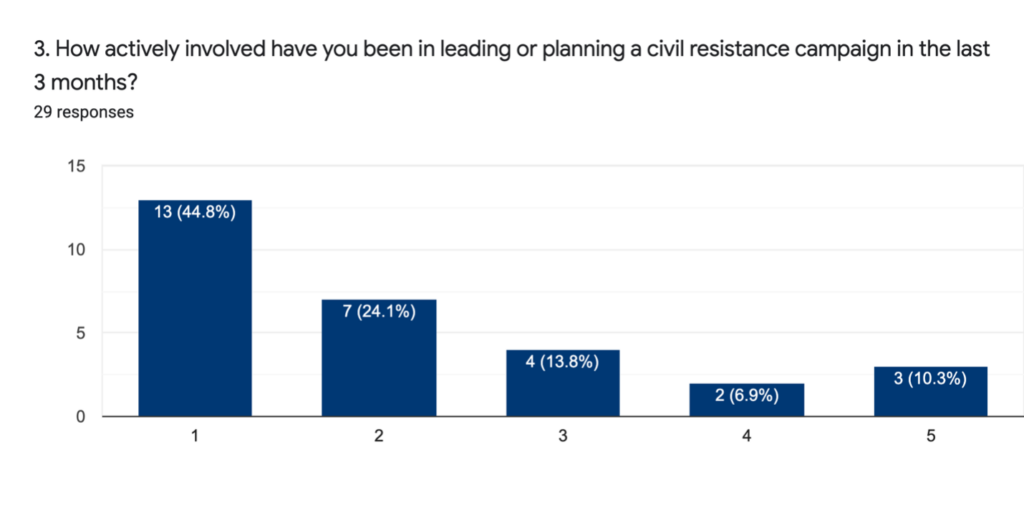 Post-course survey:
Post-course survey:
About 83% of respondents said that they were more likely (options 4 and 5) to become involve in leading or planning a civil resistance campaign, showing that the participant’s interest and desire to be more involved in civil resistance campaigns increased during the course.
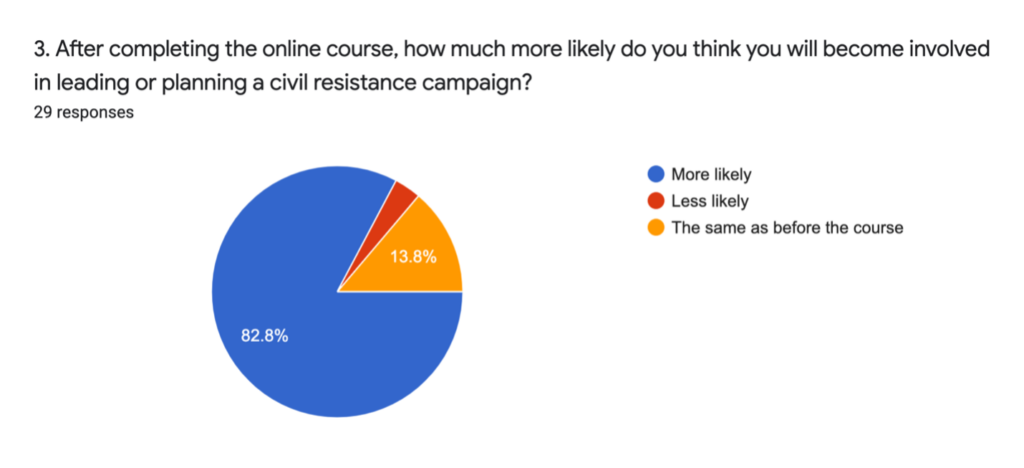
4. How skilled do you feel you are in planning or implementing a civil resistance campaign?/How skilled do you feel you are now in planning or implementing a civil resistance campaign?
Pre-course survey:
About 90% of respondents reported that they did not feel (options 1, 2, and 3) as if they had the skills to plan or implement a civil resistance campaign before completing the course.
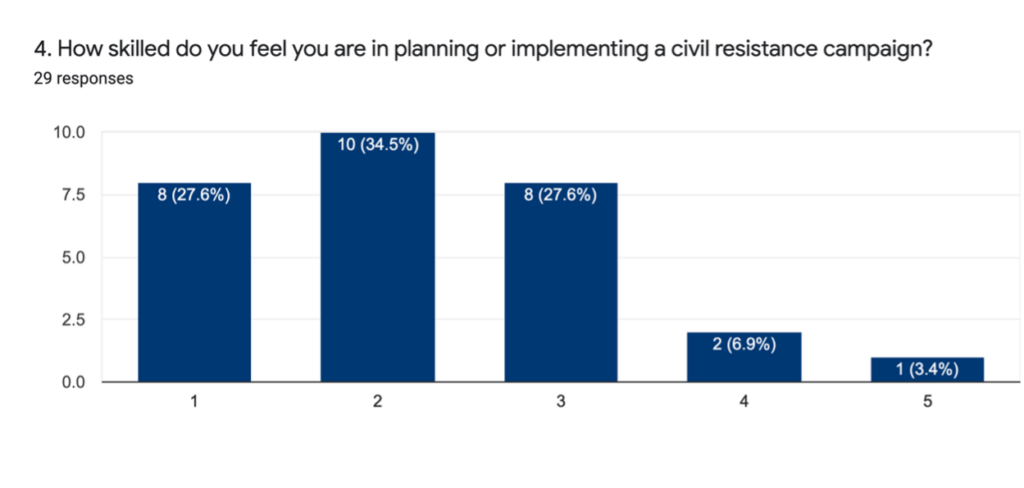
Post-course survey:
Upon completion of the course, about 75% of participants reported that they now feel that they have the skills (options 4 and 5) to plan or implement a civil resistance campaign. This shows that a participant’s skillset to organize civil resistance campaigns increased during the course. No one reported that they felt “not skilled at all” or “not very skilled.”
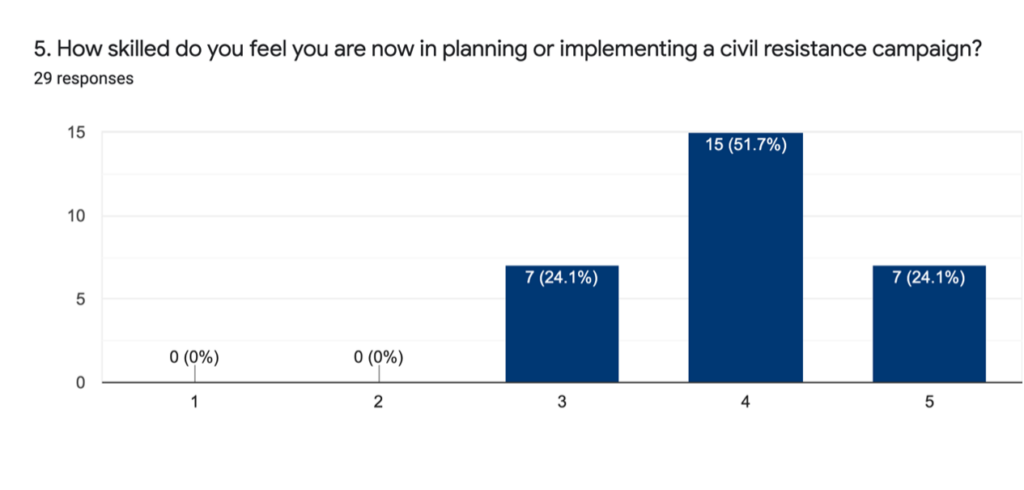
6. If you are currently participating in a civil resistance campaign, how effective do you think you are in achieving your campaign’s stated objectives in your current training’s and actions?/After having completed the online course, how much more effective do you believe you will be in achieving the stated objectives of your civil resistance trainings or campaigns?
Pre-course survey:
About 86% of participants reported that they did not feel (options 1, 2, and 3) as if they were able to effectively achieve the campaign’s stated objectives in trainings and actions before completing the course.
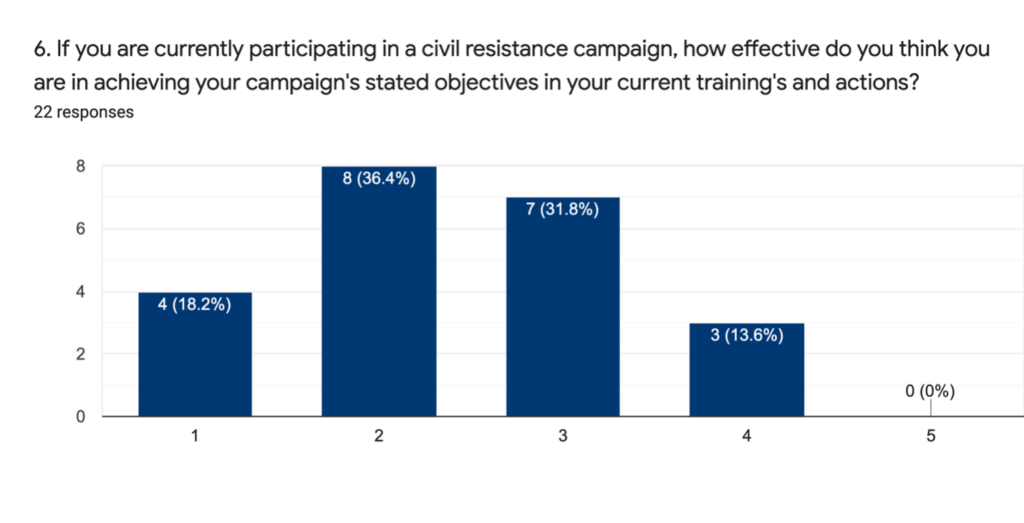
Post-course survey:
Upon completion of the course, about 82% of course participants believe that they are more effective (options 4 and 5) at achieving the goals of civil resistance training or campaigns. This shows that during the course participants became more confident about their ability to achieve the intended goals of civil resistance trainings or campaigns. 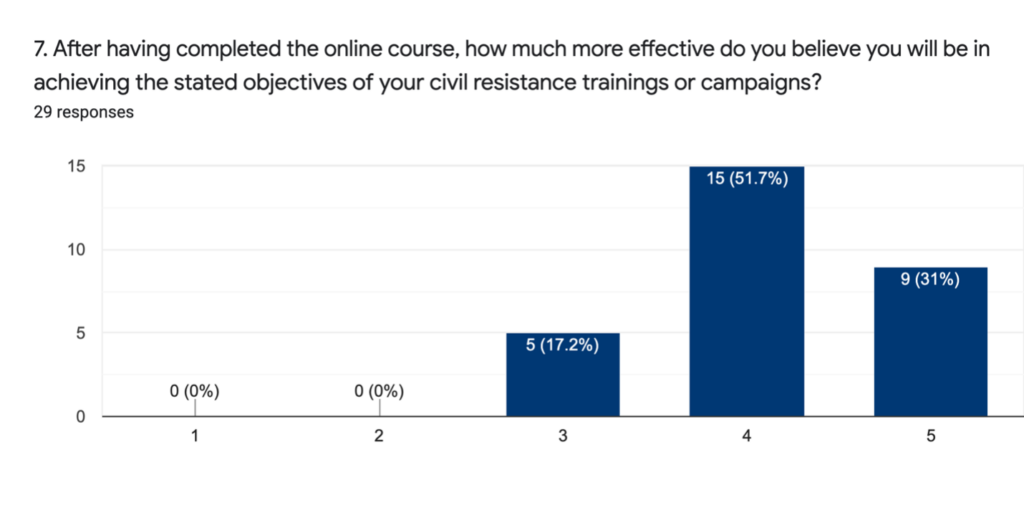
7. If you are actively involved in writing, researching, or teaching about civil resistance, how effective do you consider your work?/After taking the online course, how much more effective do you believe your writing, researching, speaking or teaching will be?
Pre-course survey:
Before the course, about 79% of respondents did not feel (options 1, 2, and 3) as if their civil resistance work was was very effective.
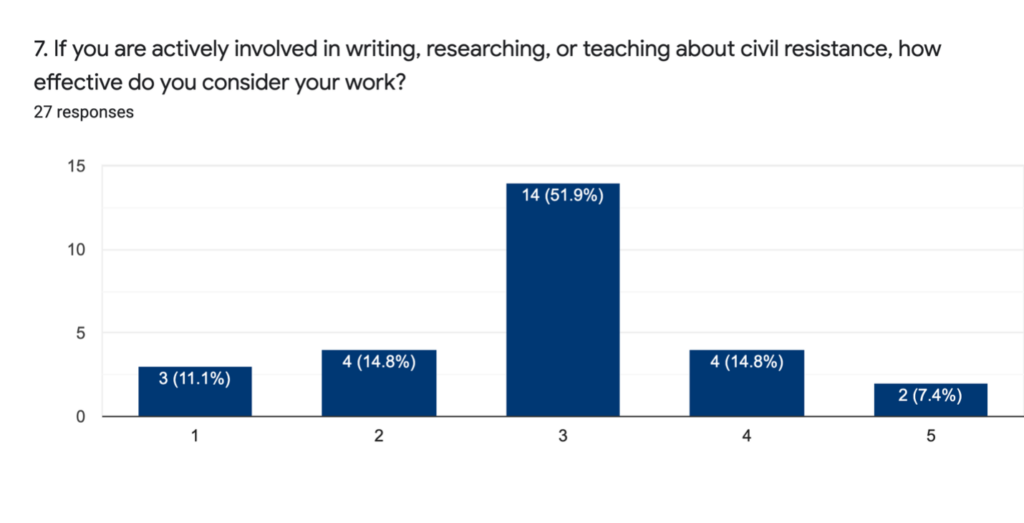 Post-course survey:
Post-course survey:
About 93% of participants reported that after the course, they felt as if their work would be more effective (options 4 and 5). This shows that the course made respondents feel more effective in their work. None of the respondents selected “not effective at all” or “not very effective.”

15. On the scale below, select the number that best represents your current knowledge of civil resistance or nonviolent movements./On the scale below, select the number that best represents your current knowledge of civil resistance or nonviolent movements.
Pre-course survey:
Before participants completed the course, about 72% of respondents reported that they did not (options 1, 2, and 3) have much knowledge of civil resistance or nonviolent movements.
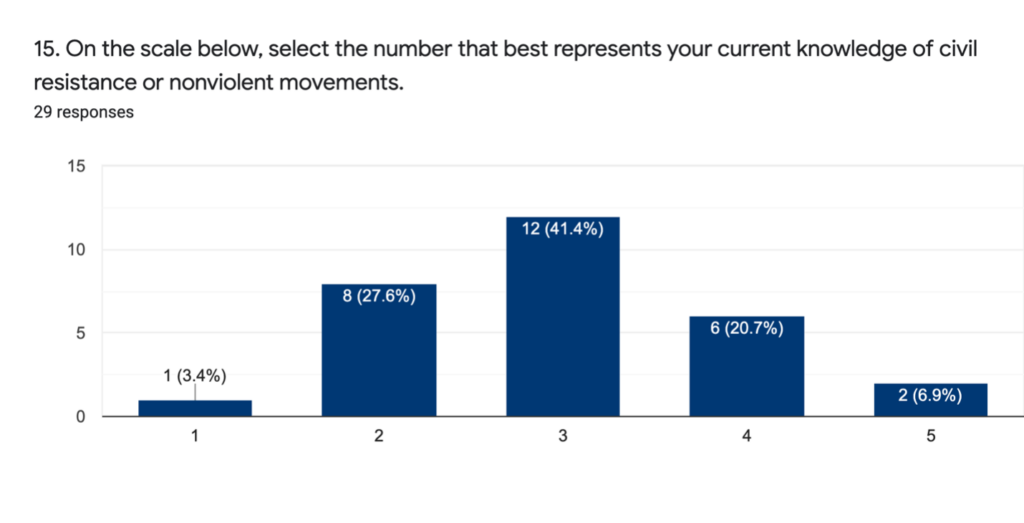
Post-course survey:
Upon completion of the course, more than 89% of respondents felt as if they had a lot (options 4 and 5) of knowledge about civil resistance or nonviolent movement. This shows that the knowledge of participants increased during the course. None of the respondents claimed that they had no knowledge of civil resistance or nonviolent movements after completing the course.
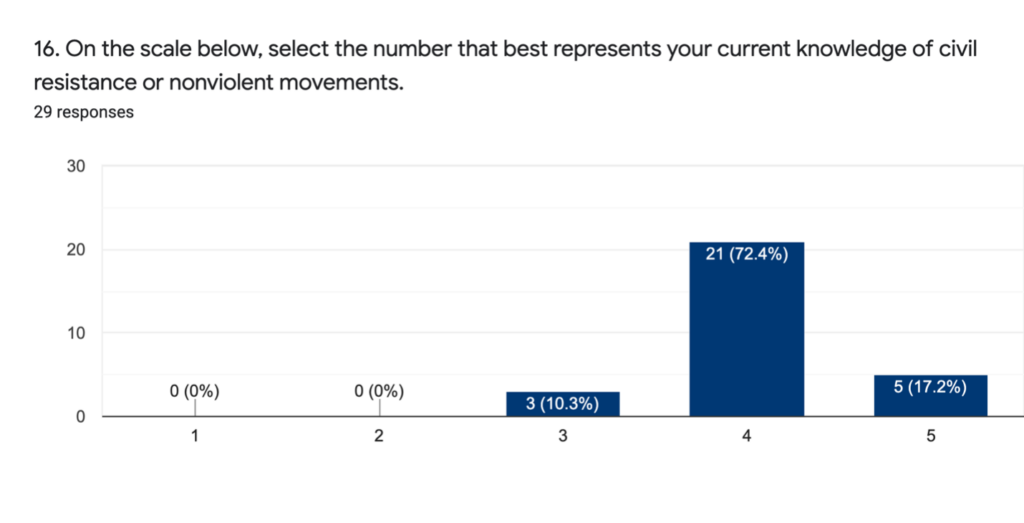
Final Evaluation Results
The participant-led course also included a final course evaluation, in order for participants to provide feedback on the course content, moderated community, course platform, and more. 34 participants completed the final course evaluation. Click on the links below to see the selected graphs for each section. You can also view the full 2021 Moderated People Power Course Final Evaluation Graphs.
I. Course Content
II. General Impression of the Course
III. Knowledge Gained
IV. Applicability
V. Self-Assessment
Selected Graphs
2. Course content was comprehensive and balanced, and topics were well selected
100% of respondents selected options 4 and 5, and no one selected 1, 2, and 3, showing that almost all of the respondents either agreed or strongly agreed that the course was comprehensive and well balanced. 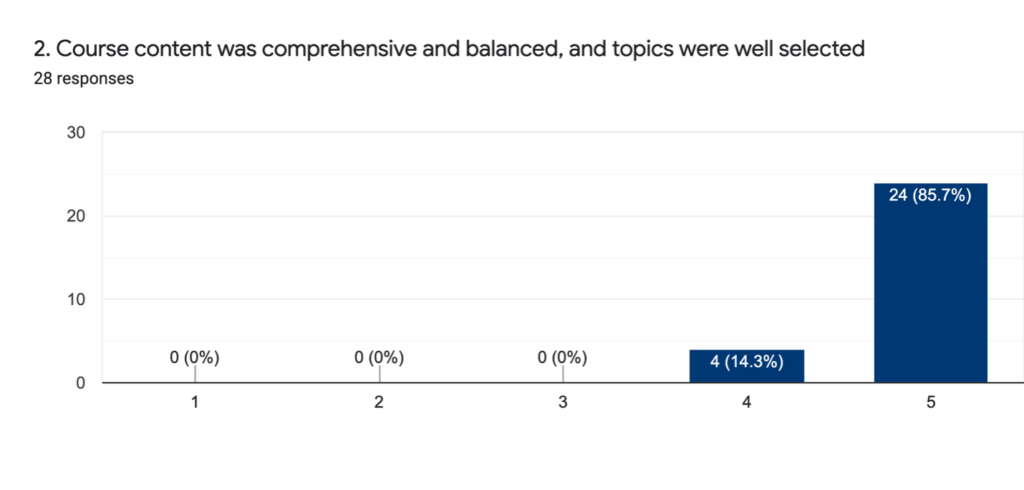
II. General Impression of the Course
9. I would recommend this course to other people
About 86% of respondents selected options 4 and 5, showing that they agreed or strongly agreed that they would recommend the course to other people.
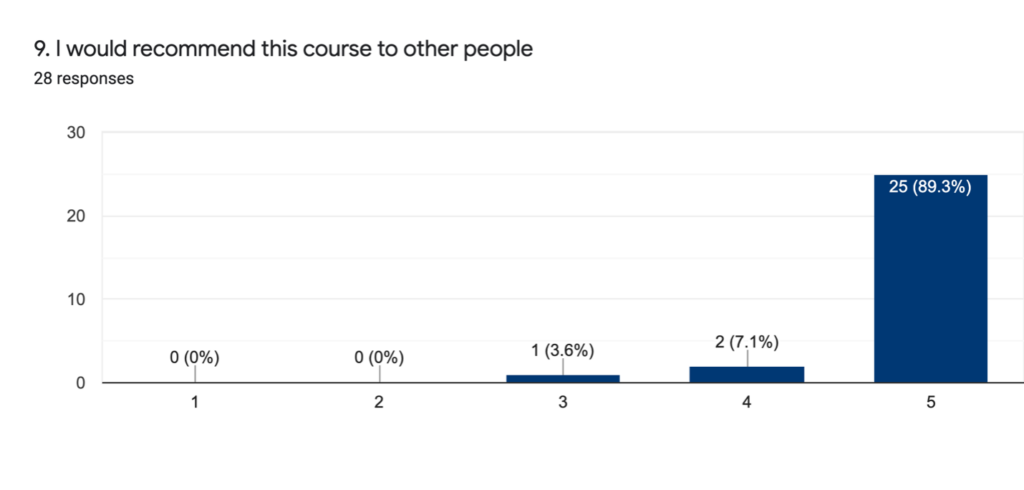
10. I now have more knowledge about civil resistance and its various topics that I had before taking the course.
100% of respondents selected options 4 and 5, showing that they agreed or strongly agreed that they had gained more knowledge about civil resistance through the course.
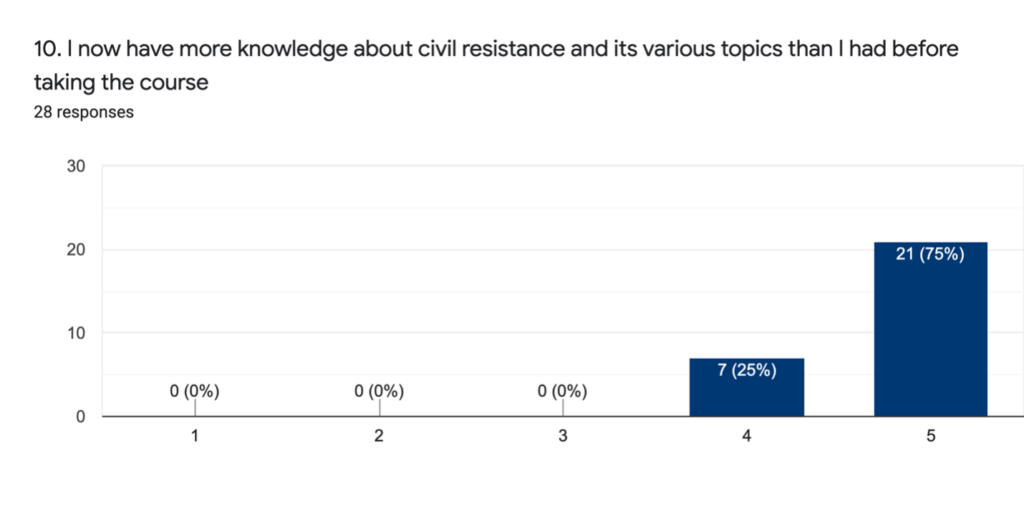
14. Course content matched my interests and professional needs.
About 96% of respondents selected options 4 and 5, showing that they agreed or strongly agreed that the course matched their interests and professional needs.
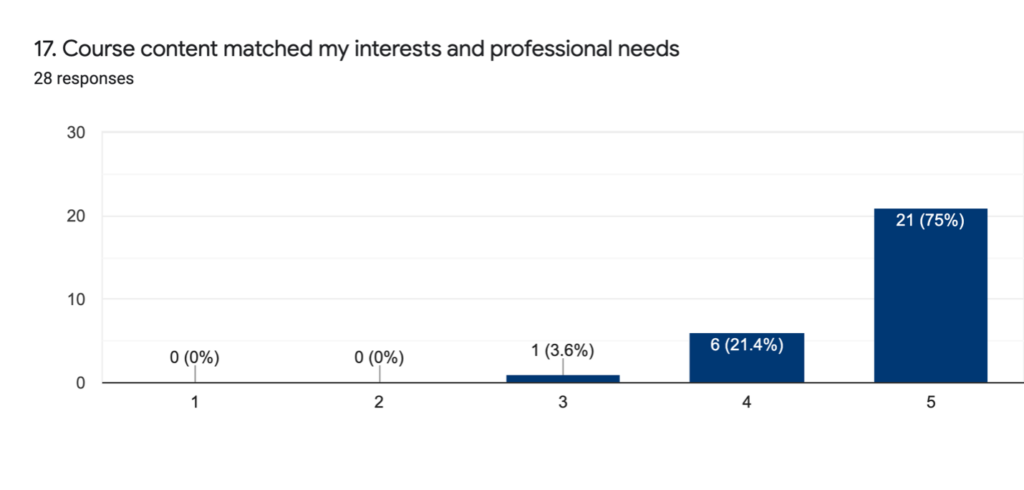
20. How would you assess your own engagement with the course material, including participation in the course forums.
About 78% of respondents rated their own engagement with the course as “high” and “very high engagement” (options 4 and 5, respectively).
Three Month Follow-Up Survey Results
The participant-led course also included a three-month post course follow-up survey, in order for participants to provide feedback on how they have applied the learnings from the course. 12 participants completed the three-month follow-up survey. Click on the links below to see the selected graphs for each section. You can also view the full 2021 People Power Online Course Three-Month Follow-Up Report.
- In the last three months, how have you primarily applied the knowledge from the course? You may select more than one option.
- As a result of the course, how actively involved have you been in a civil resistance campaign over the last three months?
- As a result of the course, how actively involved have you been in leading or planning a civil resistance campaign over the the last three months?
- If you are currently participating in a civil resistance campaign, how effective have you been in achieving your campaign’s stated objectives over the last three months?
- Please provide us with a brief description of an educational training/workshop within the last three months that you were involved in and considered to be successful. In what ways, if any, did the knowledge gained from the online course impact the training/workshop’s success?
1. In the last three months, how have you primarily applied the knowledge from the course? You may select more than one option.
According to those that responded to the three month survey, they have primarily applied their knowledge from the course in research, writing, presenting, teaching, educating, or training.
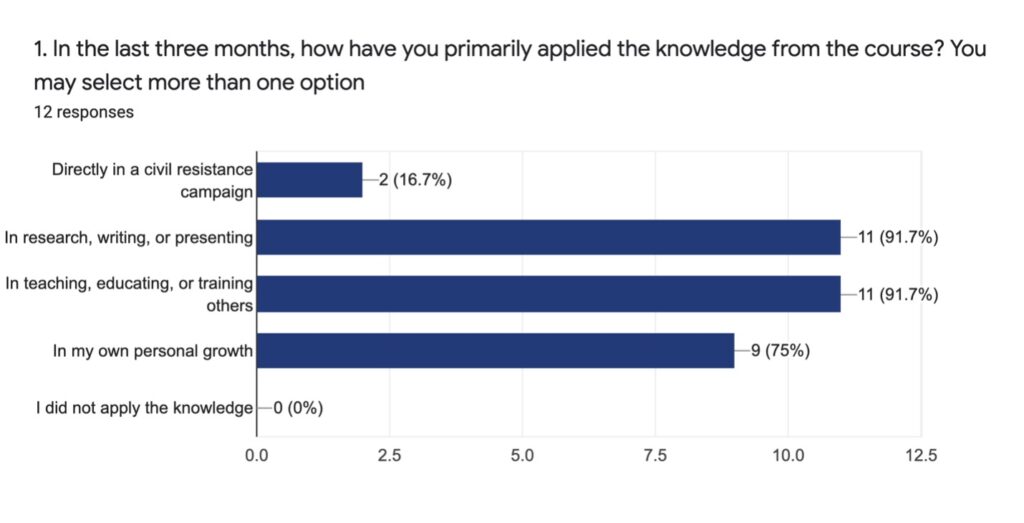
3. As a result of the course, how actively involved have you been in a civil resistance campaign over the last three months?
More than 50% of respondents stated that they have been actively involved (options 3, 4, or 5) in a civil resistance campaign since they completed the course.
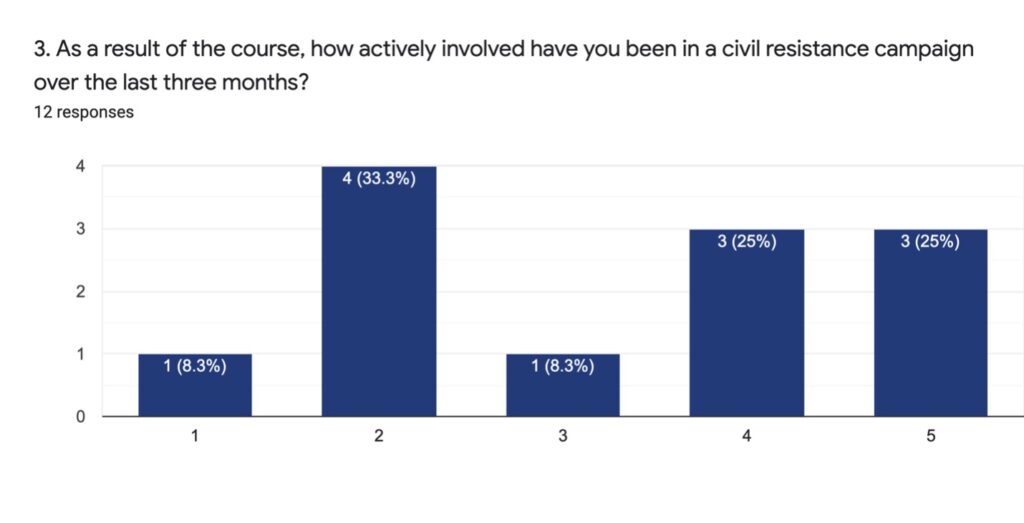
5. As a result of the course, how actively involved have you been in leading or planning a civil resistance campaign over the the last three months?
About 74% of respondents explained that they have been actively (options 3, 4, or 5) involved in leading or planning a civil resistance campaign since the course ended.

10. If you are currently participating in a civil resistance campaign, how effective have you been in achieving your campaign’s stated objectives over the last three months?
All respondents explained that they have felt effective (options 3, 4, or 5) at achieving their campaign’s objectives since they finished the course.
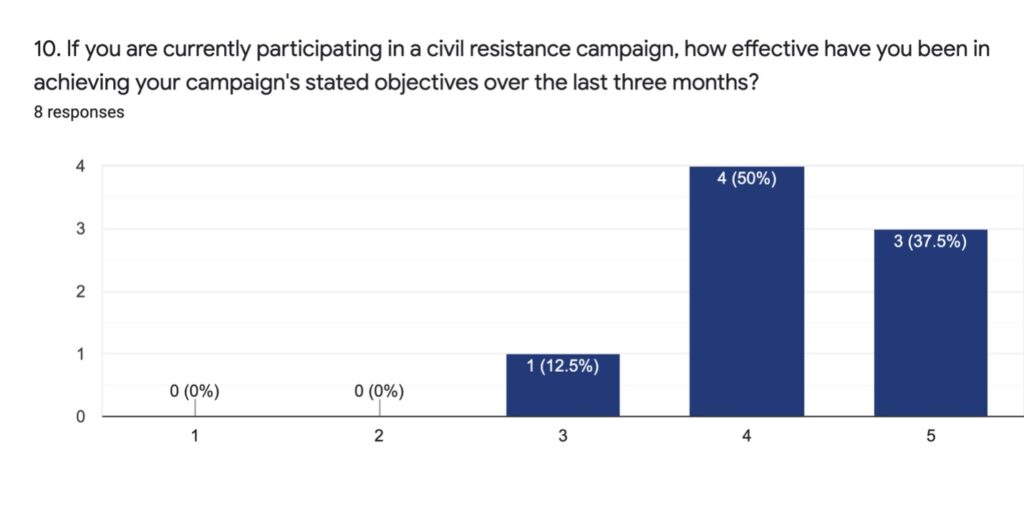 15. Please provide us with a brief description of an educational training/workshop within the last three months that you were involved in and considered to be successful. In what ways, if any, did the knowledge gained from the online course impact the training/workshop’s success?
15. Please provide us with a brief description of an educational training/workshop within the last three months that you were involved in and considered to be successful. In what ways, if any, did the knowledge gained from the online course impact the training/workshop’s success?
- I do training in nonviolent communication, and I inserted stories about nonviolent resistance, and also invited people to contemplate and take action where they can. I can’t judge accurately the impact on my participants, but the impact on me is I’m more hopeful and action-oriented.
- I am writing several proposals for funding a new generation of Tunisian youth activists and politicians. I am also writing proposals for citizen assemblies and public interest media that benefit from the insights I gained from the course.
We have just started a new programme in Future Studies (with UNED in Spain). We are linking the background in anticipation, prediction, planning to desired futures and activism as a mean to achieve those desired futures. - Training about the need for the above category to be involved in the peacebuilding process. Assessment of failures of existing peace architecture in the community. Application of SMART to what these categories bring to the fore in terms of peace.
- Strategy for advocacy for protecting the civic space in Nigeria ahead of the 2023 elections.
- I have been working with California State University in delivering different about Civil Resistance and leadership.
Tips for Future Participants
- I always tried to dive into the material as early as possible. The sooner you engage with the material the more time you get to spend with others on the discussion board. Time management is important in all things, especially this course.
- The best advice is just to keep your commitment and dedicate a block of time each day for the course. If you fell behind, it’s wise to catch up as soon as possible instead of constantly lagging behind. You can get much more out of the discussions if you follow the schedule.
- As a participant, it is important to look at your schedule and plan how to work around it. I discovered that daily participation makes it an easier load than waiting for the last 2 days of the module. Sometimes it becomes a challenge because one is tired from work and can hardly concentrate. there are times when I opted to wake up early when the mind has rested.
- The course is intense, but estimations (in advance) of time required are good. Therefore if you plan in advance (you need to do it), it is possible to keep up with the load.
- I have actually spent more than one hour per day, but it’s mostly done out of my interest. I would say interest is the mother of progress.
Selected Testimonials
- People Power is both comprehensive and rich in contents. The opportunity to read personal reflections from fellow learners & activists has given me new eyes to look at my own situation and my resistance approaches. I’m very grateful that this course has taken me out of my information bubble. I never imagined I would have tears in my eyes just by reading reports. A big thank you to everyone who’s keeping dignity and hope alive. I’m inspired to do more where I am.
- Excellent course on civil resistance. A unique, highly interactive and very interesting course containing rich and quality content on civil resistance and related subjects. A wonderful learning environment at one’s own convenience. A must for human rights defenders, peacebuilders and civil rights torch bearers.
- This course has greatly helped to expand my knowledge of civil resistance from both an academic and practical standpoint. The lessons included a very effective balance of theory and practice. Especially in these contentious times it is important to study the history of what strategies offer the most effective ways to combat injustice. This course is beneficial to both seasoned professionals and newcomers to the field. It also bring together a diversity of participants with a wide range of experiences that greatly enhance the discussions. I have no doubt that I will remain in touch with many of these participants long into the future.
- ICNC has given me valuable knowledge and skills that I had never come into contact with. I used to believe that power is in the weapon holder, after all, that’s the kind of experience we’ve been brought up with. Most of us fear thugs and the police. Why? They are armed and any armed person gives the orders, we obey. Now I know that power is in the people and it can be exercised nonviolently. The success stories are overwhelming and from today henceforth, I’ll be an advocate for nonviolent resistance. Thank you ICNC for giving me an opportunity to acquire this valuable knowledge and skills.
- People’s Power Course take you to an in depth discovery, understanding and analysis of Civil Resistance while being nonviolent. Through different well built modules, you get meaningful insights, tools and informations which can allow you to create, lead or participate in successful nonviolent movements. I highly recommend it!
- The course was very enlightening and empowering.
Support
The International Center on Nonviolent Conflict thanks Carnegie Corporation of New York for generously supporting this and our other online courses between April 1, 2020-March 31, 2022.
